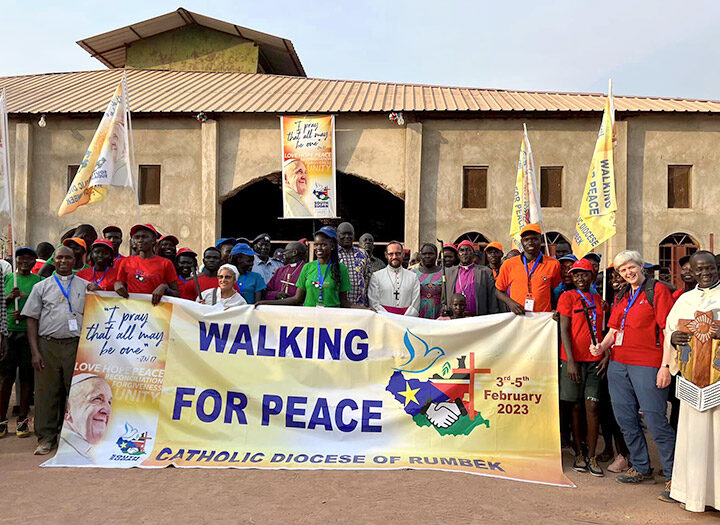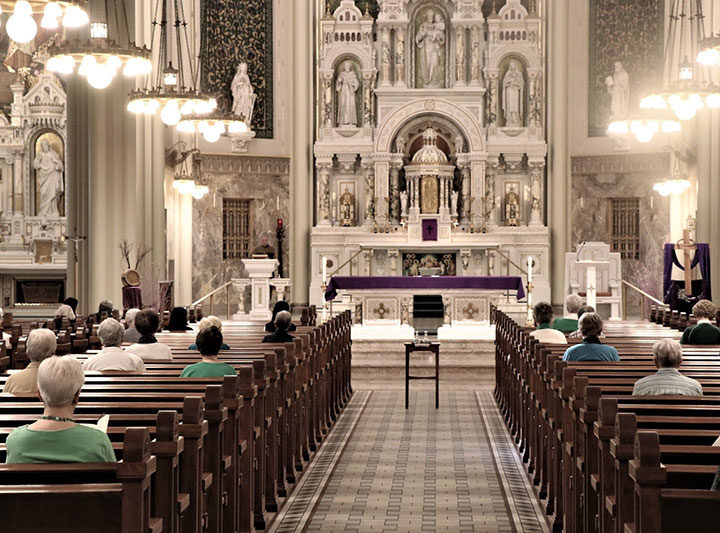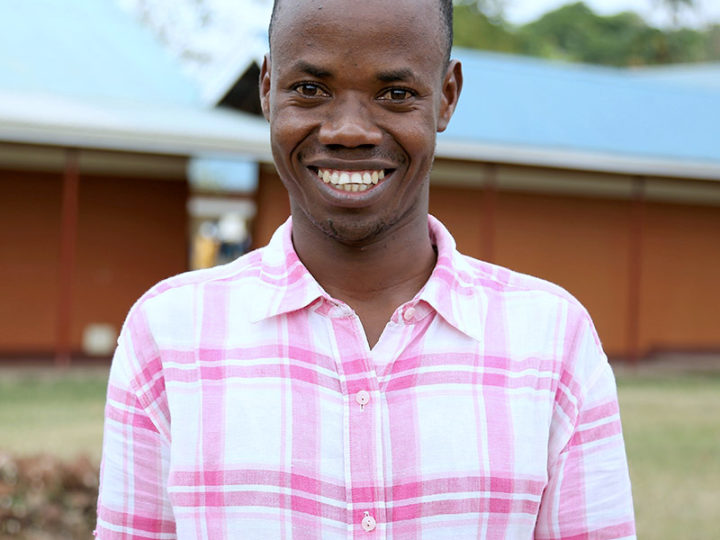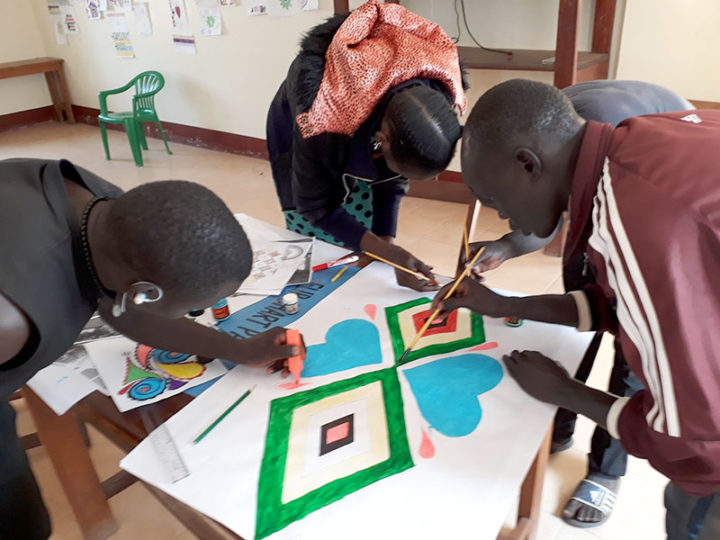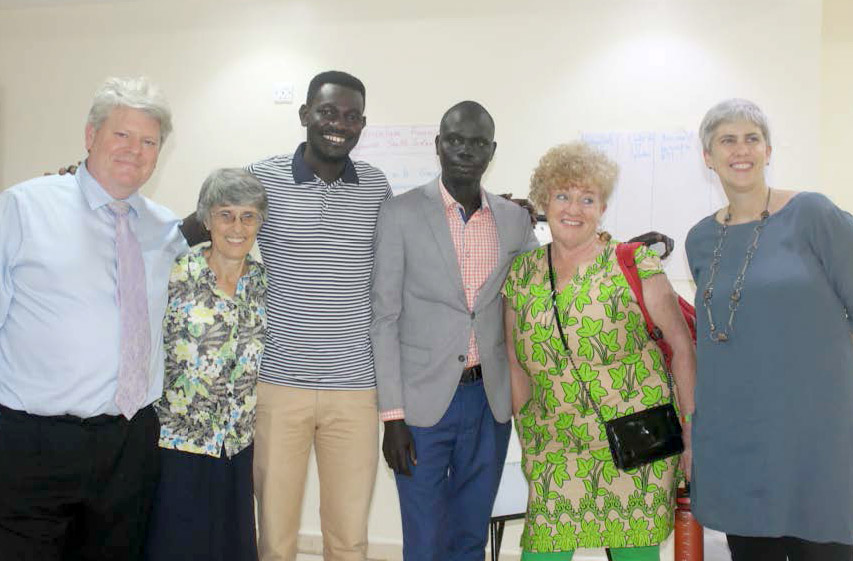
Ngaluku Lukulu Chocho is a graduate of Solidarity Teacher Training College, and received a scholarship from Solidarity with South Sudan to attend Tangaza University in Nairobi, Kenya. He describes his difficult but successful journey to become a teacher.
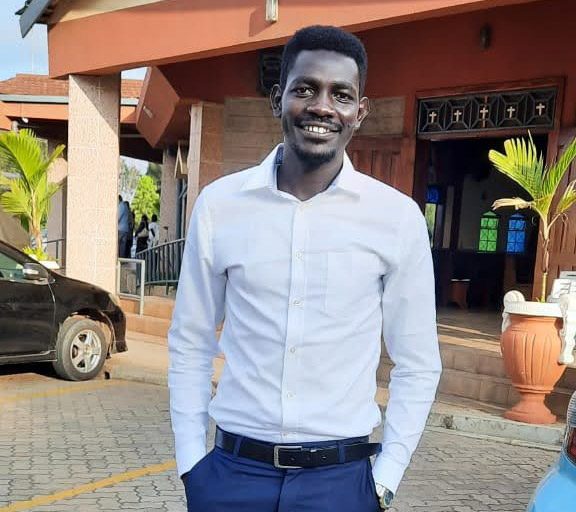
It is exceptionally overwhelming to find a helping hand from the well-wishers who genuinely mean good to the world. I write this as a lucky beneficiary of Solidarity with South Sudan scholarship, because having grown up in a war devastated region, I had never imagined that I would one day fall in the hands of well-wishers.
I was born in 1990 in Nuba Mountains region, Sudan and this was during one of the most difficult times of famine and starvation in the region at the time. And I grew up among six other siblings and other extended family members. There were no schools in some parts of the region and particularly our village Tura was a victim of this fact. In 1995, was the year when the first school was started in our village and because of the societal nature of our community, older boys and girls were given the first priority.
Four years later, I was enrolled in the school and I began pre-primary and sadly it was during the third term of the school calendar and many of my friends had already mastered the art and skill of writing and reading the alphabets both in Arabic language and in English language. For the first few weeks I felt lonely and isolated based on the fact that I was not able to read and write the alphabets like my age mates did.
As time went by, I pulled up and committed myself to outshine my friends. At the end of the term, I managed to take position three out of 50, but I do not remember how many points I had scored. That gave me a lot of motivation and I was ready to outshine everyone come next term but as we went for holidays, the conflict worsen, there were bombardments, air raiding and striking, ground attacks, looting, and landmines all over the place. So the schools closed until around 2001 during the cease fire.
I was taken back to school the year after and I started class one even though I was out of class for about three years. When I was in three class, my family sent me to another school far away from home so I could stay with my teachers in their quarter during the school time and during holidays I would walk home for about 14 hours. I studied in that school for two years and I was brought back to a nearby school that was about two hours’ walk from our home.
In 2009 I finished my national examination for primary education in Kauda. The following year 2010, the results of our examinations were released and by then if a candidate scores above 200 marks that was considered an elite performance within the region, and I was among the top performing students with 235 marks. While the results were announced, I was in the capital city (Khartoum) hustling for school basic needs unfortunately, I felt terribly sick and the money I had was all spent on my medication. Travelling to the home village was quite a challenge but I had to go into construction sites and worked for at least a month for the fare.
Finally, I got home in April 2010 when the first term examination was about to begin. I went to the government secondary school where I was to be admitted and I was sadly told that I was late and no more registration of new students although I was asked to wait for a new school that was to be started in another region which has not materialized up to now. When I shared the news with my father that evening, he was disappointed but he was also optimistic that I will get enrolled in the diocese school.
Finally, I got an opportunity to study at St. Joseph Secondary school Gidel for a year. The following year 2011, political wrangles started again and the air bombardment was at the apex and the schools closed down. As the fighting intensified, a lot of properties were damaged, countless people got killed by the bombardment and ground attacks, many cattle were driven away, many got wounded and many more and many un-countless things happened to the marginalized people of Nuba mountains. The option left for me just like many other youths was to join the military.
The whole of year of 2011 I never had a chance to sit in a classroom and read as my interest always drove me to but towards the end of the year, I attended a computer course for two months although we kept running and ducking from bombardment and shrapnel almost on a daily basis until we finished the course. Around November, the situation got worse so I fled with my two cousin brothers to the refugee camp Kakuma, Kenya. Life in the camp was quite difficult although there was a relative peace and security but again it was encroached and interrupted by the host community from time to time.
In the year 2012, I joined form two in the camp but I was hit hard by Kiswahili as a compulsory subject in high school and it being a new language to me made the situation very difficult for me. In 2014, I finished my candidate class and immediately left the camp to South Sudan. Reaching Juba, I was faced with yet another hard reality that I was to hustle for survival and so I entered into construction as a casual worker but the work was not constant, sometimes we would work for a week and the work will stop and the little I got would just get finished on feeding and other basics.
After a month of my stay in Juba, I had a chance to do an interview for joining STTC Yambio and after a month or so I received an amazing news that I highly passed the interview and I was going to join the college in March of 2015. I got enrolled into the program in 2015 and successfully did the training for two years and thereafter I was lucky enough to get scholarship to study in Tangaza University College, Nairobi Kenya.
Solidarity with South Sudan has greatly helped me advanced in academics. Looking at the family background, I knew I will not get any single penny to continue with my university education and I never knew I will ever find a scholarship to study in a university. As it stands now in my family, I am the only one who went to the university. Today I walk with my head held up high not because of my making but because of the sacrifices made by the donors, well-wishers and Solidarity to invest in my studies. I take some pride in my efforts and in my university performance but I sincerely dedicated my first class honors to Solidarity with South Sudan and all the well-wishers and I attribute my huge success to all who trusted me especially Sister Margaret Scott.
In general, the scholarship project means so much to the two sisterly countries Sudan and South Sudan. These countries have been exposed to generation of wars and conflicts and so majority of the citizens are illiterate. Therefore, this project gives the natives an opportunity to learn and explore their potentials in academics and give back to their own communities through teaching. Another essential significance of the project is that it opens the way for the citizens and governments to invest in education and especially in training qualified personnel to get involve in teaching and learning to achieve the national goals of the curriculum.
It is also worthy to mention that the program has given the natives so much sense of belonging and ownership. With time all the missionaries will leave to run other missions somewhere so the program helps the natives to be self- reliant, independent and master skills and expertise to run and manage the education programs in the country.
In conclusion, I the beneficiary of the scholarship program remain very grateful for the opportunity given to me and to my friends and now back to the college as tutors. My presence in the college as a tutor means so much to my students that they are able to identify themselves with me as one of their own who went through troubles as well but never gave up to this far. Their lose hopes are getting restored and they are beginning to realize the nobility of the teaching profession.
Top photo: Ngaluku Lukulu (third from left) and Sister Jacinta Prunty (second from left) from Solidarity Teacher Training College were among those attending a Curriculum Foundation UK workshop in Juba, South Sudan, in early December 2022.


